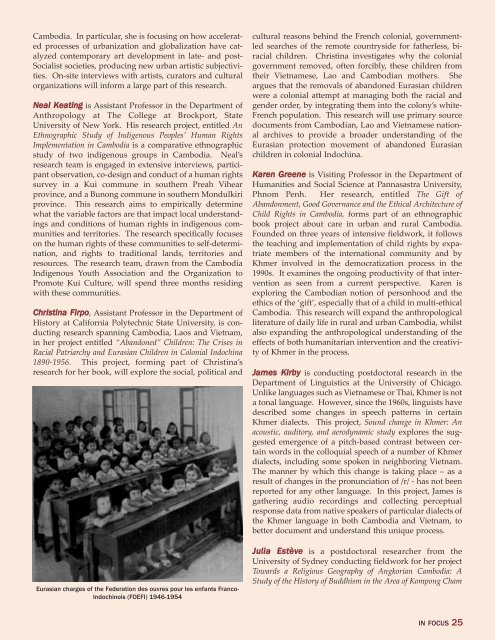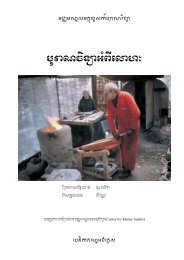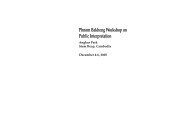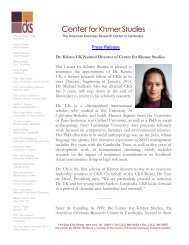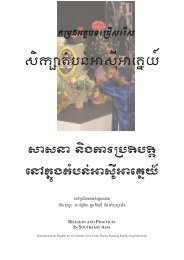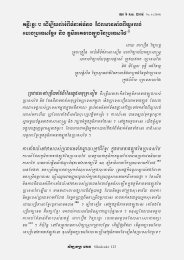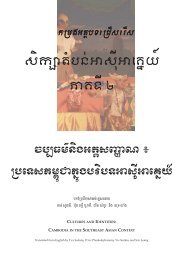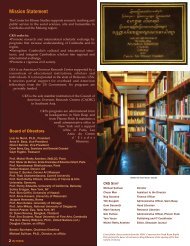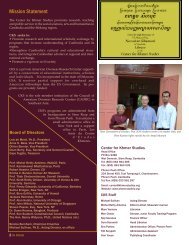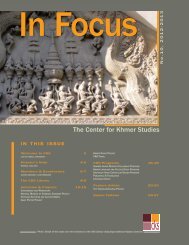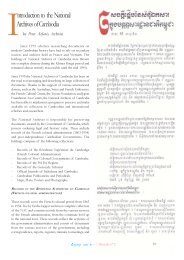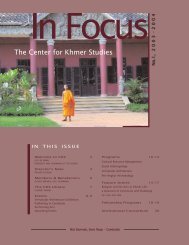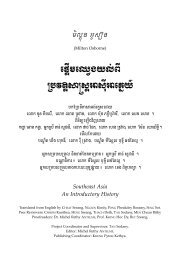2011-2012 - Center for Khmer Studies
2011-2012 - Center for Khmer Studies
2011-2012 - Center for Khmer Studies
- No tags were found...
You also want an ePaper? Increase the reach of your titles
YUMPU automatically turns print PDFs into web optimized ePapers that Google loves.
Cambodia. In particular, she is focusing on how acceleratedprocesses of urbanization and globalization have catalyzedcontemporary art development in late- and post-Socialist societies, producing new urban artistic subjectivities.On-site interviews with artists, curators and culturalorganizations will in<strong>for</strong>m a large part of this research.Neal Keating is Assistant Professor in the Department ofAnthropology at The College at Brockport, StateUniversity of New York. His research project, entitled AnEthnographic Study of Indigenous Peoples’ Human RightsImplementation in Cambodia is a comparative ethnographicstudy of two indigenous groups in Cambodia. Neal’sresearch team is engaged in extensive interviews, participantobservation, co-design and conduct of a human rightssurvey in a Kui commune in southern Preah Vihearprovince, and a Bunong commune in southern Mondulkiriprovince. This research aims to empirically determinewhat the variable factors are that impact local understandingsand conditions of human rights in indigenous communitiesand territories. The research specifically focuseson the human rights of these communities to self-determination,and rights to traditional lands, territories andresources. The research team, drawn from the CambodiaIndigenous Youth Association and the Organization toPromote Kui Culture, will spend three months residingwith these communities.Christina Firpo, Assistant Professor in the Department ofHistory at Cali<strong>for</strong>nia Polytechnic State University, is conductingresearch spanning Cambodia, Laos and Vietnam,in her project entitled “Abandoned” Children: The Crises inRacial Patriarchy and Eurasian Children in Colonial Indochina1890-1956. This project, <strong>for</strong>ming part of Christina’sresearch <strong>for</strong> her book, will explore the social, political andEurasian charges of the federation des ouvres pour les enfants francoindochinois(foEfi) 1946-1954cultural reasons behind the French colonial, governmentledsearches of the remote countryside <strong>for</strong> fatherless, biracialchildren. Christina investigates why the colonialgovernment removed, often <strong>for</strong>cibly, these children fromtheir Vietnamese, Lao and Cambodian mothers. Sheargues that the removals of abandoned Eurasian childrenwere a colonial attempt at managing both the racial andgender order, by integrating them into the colony’s white-French population. This research will use primary sourcedocuments from Cambodian, Lao and Vietnamese nationalarchives to provide a broader understanding of theEurasian protection movement of abandoned Eurasianchildren in colonial Indochina.Karen Greene is Visiting Professor in the Department ofHumanities and Social Science at Pannasastra University,Phnom Penh. Her research, entitled The Gift ofAbandonment, Good Governance and the Ethical Architecture ofChild Rights in Cambodia, <strong>for</strong>ms part of an ethnographicbook project about care in urban and rural Cambodia.Founded on three years of intensive fieldwork, it followsthe teaching and implementation of child rights by expatriatemembers of the international community and by<strong>Khmer</strong> involved in the democratization process in the1990s. It examines the ongoing productivity of that interventionas seen from a current perspective. Karen isexploring the Cambodian notion of personhood and theethics of the ‘gift’, especially that of a child in multi-ethicalCambodia. This research will expand the anthropologicalliterature of daily life in rural and urban Cambodia, whilstalso expanding the anthropological understanding of theeffects of both humanitarian intervention and the creativityof <strong>Khmer</strong> in the process.James Kirby is conducting postdoctoral research in theDepartment of Linguistics at the University of Chicago.Unlike languages such as Vietnamese or Thai, <strong>Khmer</strong> is nota tonal language. However, since the 1960s, linguists havedescribed some changes in speech patterns in certain<strong>Khmer</strong> dialects. This project, Sound change in <strong>Khmer</strong>: Anacoustic, auditory, and aerodynamic study explores the suggestedemergence of a pitch-based contrast between certainwords in the colloquial speech of a number of <strong>Khmer</strong>dialects, including some spoken in neighboring Vietnam.The manner by which this change is taking place – as aresult of changes in the pronunciation of /r/ - has not beenreported <strong>for</strong> any other language. In this project, James isgathering audio recordings and collecting perceptualresponse data from native speakers of particular dialects ofthe <strong>Khmer</strong> language in both Cambodia and Vietnam, tobetter document and understand this unique process.Julia Estève is a postdoctoral researcher from theUniversity of Sydney conducting fieldwork <strong>for</strong> her projectTowards a Religious Geography of Angkorian Cambodia: AStudy of the History of Buddhism in the Area of Kompong Chamin focus 25


